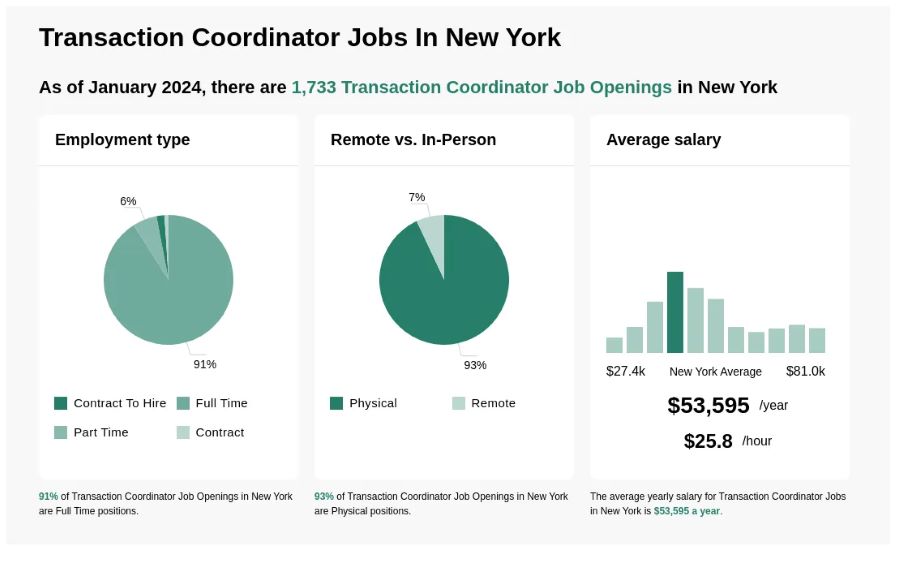The real estate industry offers diverse career paths beyond the role of a sales agent. One vital position within real estate teams and brokerages is that of a real estate transaction coordinator. This position plays a crucial role in ensuring the smooth execution of real estate transactions along with supporting real estate teams by managing administrative tasks. In this article, I dive into the critical functions and significance of transaction coordinators, outlining their responsibilities, their impact on real estate transactions, and the financial aspects of their role.
Transaction Coordinator: Definition & Importance
A real estate transaction coordinator is an indispensable member of the real estate team. These professionals alleviate the administrative burden of real estate agents by managing the detailed and often complex paperwork required for buying and selling properties. Their role begins once a property is under contract and continues until the deal closes. This professional ensures that every real estate transaction’s steps adhere to timelines, legal requirements, and all parties’ expectations.
To excel in their role, coordinators must comprehensively understand real estate processes and regulations. They are detail-oriented and have exceptional organizational and communication skills. These skills allow them to coordinate effectively among buyers, sellers, real estate agents, lenders, and escrow companies. Their expertise facilitates a smoother transaction and mitigates risks by ensuring compliance with all legal and regulatory standards.
What Does a Transaction Coordinator Do?
The role of a transaction coordinator is multifaceted, encompassing a range of tasks to streamline the real estate transaction process. They serve as the backbone of the transaction to ensure every detail is managed efficiently—from the initial agreement to the final closing. Here’s a closer look at the specific responsibilities that fall under their purview, although these tasks may vary depending on the brokerage or team.

Example job description (Source: Pro R.E.A. Staffing)
- Document management: Collect, organize, and ensure proper signing and storage of transaction documents
- Deadline tracking: Monitor and communicate critical inspections, contingencies, and closing deadlines
- Coordination tasks: Schedule inspections, appraisals, and viewings; facilitate communication among all parties
- Compliance checks: Ensure transactions adhere to legal and ethical standards
- Communication: Act as the main point of contact, providing updates and answering queries
- Financial coordination: Manage the escrow process and assist with closing financials
- Problem-solving: Resolve issues, ensuring a smooth path to closing
Transaction coordinators significantly lighten the load for real estate agents by taking charge of the transactional details. It enables agents to concentrate on the more client-facing aspects of their work, such as securing listings and guiding buyers and sellers through the process.
For clients, the coordinator acts as a reassuring point of contact, providing updates and clarifications throughout the journey from contract to closing. Their meticulous attention to detail and deadlines ensures that transactions proceed as smoothly and efficiently as possible to avoid unnecessary delays or complications.
How to Become a Transaction Coordinator
Pursuing a career in this role involves a blend of education, practical experience, and continuous improvement. By focusing on these areas, you can establish a foundation for a rewarding career in real estate and play a crucial role in the success of transactions. While a real estate license isn’t required, it is definitely a plus for most employers. Here are the steps to take to start your journey:
- Education and training: A high school diploma is the minimum requirement, with many employers preferring candidates who have a college degree in real estate, business, or a related discipline. A foundational understanding of real estate principles is also achievable through formal education or self-study.
- Skills development: Success as a real estate transaction coordinator depends on excellent organizational and communication skills and proficiency with industry-specific software. Developing these skills is essential for managing the complexities of real estate transactions and communicating effectively with all parties involved.
- Real estate experience: Administrative roles within real estate offices can provide valuable exposure to the industry. Look for opportunities that offer on-the-job training in transaction coordination to build direct experience and understand the role’s demands.
- Certification: Certification is not mandatory but can bolster your qualifications. Organizations such as the National Association of Realtors offer courses and certifications for real estate certifications.
- Networking: Building connections with real estate professionals and joining professional groups are effective ways to learn about opportunities. Engaging with online forums and local real estate communities can also keep you updated on industry trends and practices.
- Continuous learning: The real estate sector is governed by frequently changing laws and regulations. Committing to continuous learning through courses and keeping abreast of the latest industry developments is crucial for maintaining your effectiveness and compliance in the role.
Pros & Cons of Being a Transaction Coordinator
Becoming a transaction coordinator is critical for ensuring the smooth execution of real estate transactions. However, the role comes with its own set of demands and limitations. Individuals considering this career path should carefully weigh the benefits and downsides of the role to understand what the job entails. The following table outlines the pros and cons:
| PROS | CONS |
|---|---|
| Gain expertise in administrative tasks, legal compliance, and client communication. | Face the challenge of managing complex details under tight deadlines. |
| No need for a real estate license, offering an accessible entry point into the real estate industry. | Earnings can fluctuate based on the number of transactions and specific compensation models. |
| Potential for remote work and flexible hours, appealing to those seeking work-life balance. | Responsible for the accuracy of important legal documents and adherence to regulatory compliance. |
| Provides a pathway to other real estate positions and roles within the industry. | Transaction volume and workload, as well as income, can vary with real estate market fluctuations. |
| Works closely with real estate agents, clients, and other stakeholders, building a broad professional network. | Transaction coordinators do not engage in property price negotiations, which may limit their involvement in strategic aspects of transactions. |
Differences Between Transaction Coordinators & Real Estate Agents
Coordinators and real estate agents play pivotal but distinct roles in buying and selling properties. While both contribute significantly to the success of transactions, their responsibilities, work environments, and compensation models differ. Grasping the distinctions between these roles can guide you in deciding which position suits your career aspirations. The following table clearly compares real estate transaction coordinators and real estate agents:
Aspect | Transaction Coordinator | Real Estate Agent |
|---|---|---|
Primary Role | Manages administrative and logistical aspects of real estate transactions | Markets properties, assists clients in buying or selling, and negotiates deals |
Responsibilities | Handles paperwork, deadlines, and coordinates communication among involved parties | Identifies property listings, conducts property showings, and provides market analysis |
Licensing | Typically does not require a real estate license | Requires a state-issued real estate license |
Compensation | Paid a salary, per transaction, or hourly rate | Earns commission based on the sale or purchase price of properties |
Work Environment | Can often work remotely | Usually works in the field, showing properties and meeting clients |
Skills & Education | Organizational, communication, and familiarity with real estate transaction processes | Sales, negotiation, and in-depth knowledge of the real estate market |
Transaction Coordinator Compensation
Several factors influence earnings, and this includes the complexity of transactions, experience level, and demand for their services within the local market. Compensation for a transaction coordinator for real estate can also vary widely based on their employment status and the volume of transactions.

Transaction coordinator jobs in New York (Source: ZipRecruiter)
According to Glassdoor, salaries can range from $47,000 to $72,000 annually. Typically, real estate transaction coordinators are compensated through one of several methods:
- Salary: Some coordinators are salaried employees of real estate firms or brokerages who receive a consistent paycheck regardless of the number of transactions.
- Per transaction: A common payment structure is a flat fee per transaction that allows coordinators to earn based on the number of deals they manage.
- Hourly rate: Although this is less common, they may be paid an hourly rate for their services, which offers flexibility for varying workloads.
- Payment combination: In some cases, coordinators receive a base salary with additional compensation per transaction to balance stability with performance incentives.
Frequently Asked Questions (FAQs)
A real estate license is not typically required to become a transaction coordinator. However, a deep understanding of the real estate transaction process, familiarity with real estate laws, and proficiency in relevant software and tools are essential. Some employers may prefer or require certification specific to transaction coordination.
Yes, they can work remotely, depending on their employer’s policy or business model. The nature of their work, which involves handling paperwork, coordinating schedules, and communicating with various parties, can often be done effectively from a remote location.
The role is focused on the administrative and logistical aspects of closing a real estate transaction, such as managing paperwork, deadlines, and communication among the parties involved. In contrast, a real estate agent’s primary role is to market properties, assist clients in buying or selling real estate, and negotiate transactions. While agents are directly involved in the sales process, coordinators provide behind-the-scenes support to ensure the transaction progresses smoothly.
Bottom Line
The role of a transaction coordinator is crucial in the real estate industry, offering indispensable support to real estate transactions. By managing administrative tasks, adhering to deadlines, and coordinating among various parties, they minimize errors and streamline the buying and selling process. With the right education, skills, and experience, aspiring coordinators can embark on a rewarding career path that is both challenging and essential to the real estate sector.